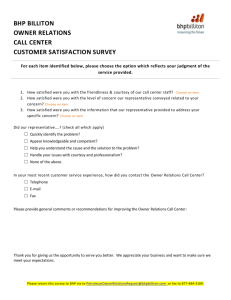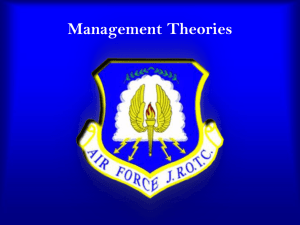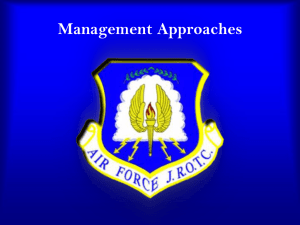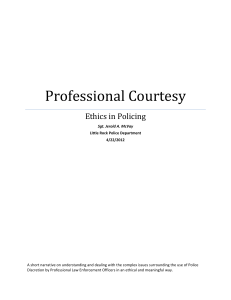File
advertisement
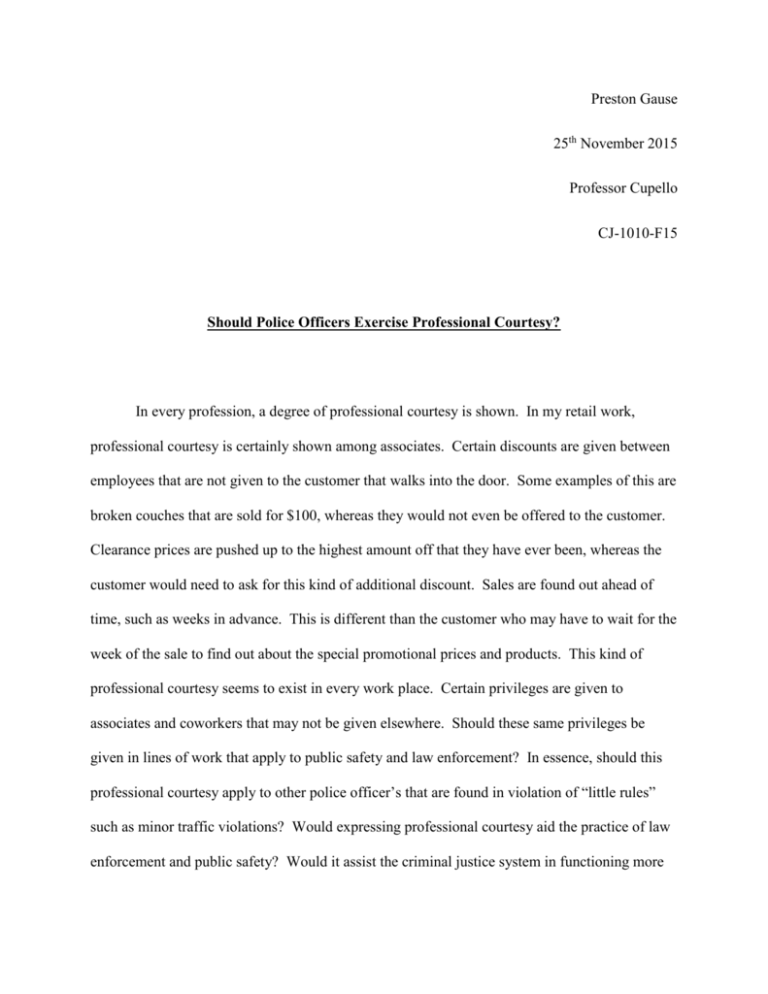
Preston Gause 25th November 2015 Professor Cupello CJ-1010-F15 Should Police Officers Exercise Professional Courtesy? In every profession, a degree of professional courtesy is shown. In my retail work, professional courtesy is certainly shown among associates. Certain discounts are given between employees that are not given to the customer that walks into the door. Some examples of this are broken couches that are sold for $100, whereas they would not even be offered to the customer. Clearance prices are pushed up to the highest amount off that they have ever been, whereas the customer would need to ask for this kind of additional discount. Sales are found out ahead of time, such as weeks in advance. This is different than the customer who may have to wait for the week of the sale to find out about the special promotional prices and products. This kind of professional courtesy seems to exist in every work place. Certain privileges are given to associates and coworkers that may not be given elsewhere. Should these same privileges be given in lines of work that apply to public safety and law enforcement? In essence, should this professional courtesy apply to other police officer’s that are found in violation of “little rules” such as minor traffic violations? Would expressing professional courtesy aid the practice of law enforcement and public safety? Would it assist the criminal justice system in functioning more effectively? Would the practice of professional courtesy raise ethical issues? Lastly, should professional courtesy among police officers be eliminated? These are the questions that will be discussed. Professional courtesy is something that is expressed in every workplace. It is something that will and should continue for the bettering of all those involved. Should professional courtesy be extended to police officer’s? This is a question that each of us has asked while sitting at a red light when you hear the familiar sound of police sirens and see the lights that seem to attract the eyes to the sight of them. When you see them go through the red light or cause you to miss your opportunity to go through the intersection, you think, “Why are they the only ones who get to break the law and get away with it?” Why haven’t they gotten pulled over? This question has also been asked when a police officer is seen on the road going over the speed limit. When we as citizens do something such as go over the speed limit, we run the risk of getting pulled over and charged with speeding. Should this same law apply to police officers as well? Or should professional courtesy be applied to them? Professional courtesy is defined as “A form of mutual respect among people in the same line of work” according to Urban Dictionary.com. This mutual respect among police officers is one that happens at times in the form of minor traffic violations being looked over. This is something that, in my opinion, officers should continue. The reason being this: when the chips are down and you as an officer need backup and the officer that is sent is one that you have pulled over, do you want the officer who is in situation A where although they were pulled over for a traffic violation and given a warning rather than a ticket or the officer in situation B where a ticket was written and now they are in charge of helping preserve your life? I know that I would certainly rather have situation A officer rather than an officer from situation B. Professional courtesy is something that is expressed in every workplace. It is something that will and should continue for the bettering of all those involved. Does professional courtesy aid the practice of law enforcement and public safety? In ways it does and in other ways it does not. The way it does aid law enforcement and public safety is in helping the morale of the officers involved. Once again going back to the two situations described earlier, do I as a citizen want an officer to come to my aid who has had a good day or a bad day? I know for me, I would much prefer an officer who is in a good mood rather than one that is in a bad mood. The officer that has had a good day is the one who is sympathetic to my plight whereas the officer who has had a bad day is the one who may not be as sympathetic and/or as caring of my situation. Professional courtesy also aids public safety. Once again, the officer who is happier is a much better officer than the one who is upset about something small like a minor traffic violation. I would much rather have an officer who is in a good mood than a bad one. Professional courtesy is something that is expressed in every workplace. It is something that will and should continue for the bettering of all those involved. Does professional courtesy assist the criminal justice system in functioning more effectively? It does. The reason being that as the old saying goes, “happy employees equal happy customers” according to qualtiydigest.com. Therefore, having happy police officer’s will equal happy citizens. Once again, the point that having a happy officer compared to an upset officer is day and night difference. The happy officer will be one who will look at people having minor traffic violations more forgivingly rather than the upset officer who would tend to nitpick every little violation to the fullest degree possible. As well, the opposite could be true also. The happy officer would be the more productive employee while the upset officer would not be near as productive as the happy officer. Once again, professional courtesy is something that is expressed in every workplace. It is something that will and should continue for the bettering of all those involved. Does professional courtesy raise ethical issues? Yes and no. The way it could is that someone could receive more leniency than they should. Particularly in a field such as law enforcement. The question comes back to-Where is the line? When has one given too much leniency? In my opinion, something such as minor traffic violations such as going five miles per hour over the posted speed limit is a minor incident and should be treated as such, minimally. However, anything above be enforced with the necessary force, such as a ticket or a harsher warning. Any other crime should be punished as the law directs. There is a way that professional courtesy does not raise ethical issues. The way to answer this, in my opinion, is “Would I be willing to give this same break to the people I am serving?” In my line of work, when an employee wants a discount on an item I have to ask myself this as well. If the discount stays within certain parameters that I would be willing to give my customers as well, I then give the employee that discount. If I would not be willing to do so, then the discount is not available to them. Professional courtesy is something that is expressed in every workplace. It is something that will and should continue for the bettering of all those involved. Lastly, should professional courtesy be eliminated? I do not think it should be nor can it be. As we have discussed, professional courtesy is something that is expressed in every workplace. It is something that will and should continue for the bettering of all those involved.
